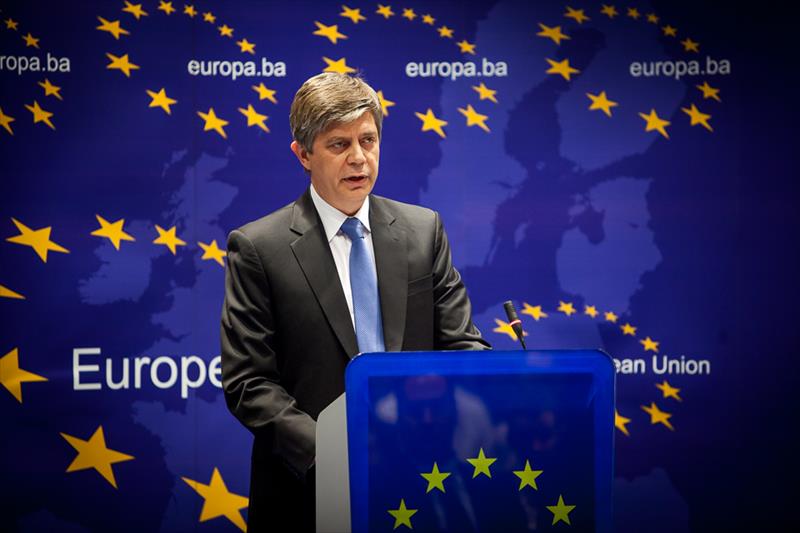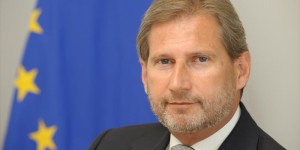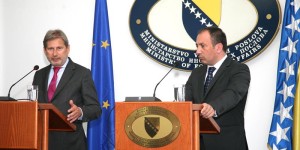Ambassador Wigemark: Let me just say first of all how pleased I am to be here today. Finally – it’s been a few months waiting to come here. I would also like to begin by paying tribute to the Deputy Head of the Delegation who has been acting Head of the Delegation, Renzo Daviddi, for several months, he has done great work here holding not just the office of the European Union together but also in terms of lot of work that has been done between the European Union and Bosnia and Herzegovina. I would also like to introduce my better half, my wife Rebecca, sitting here up front and who is very happy to be back in this part of Europe again after many, many years.
Let me just start by giving you a few introductory remarks.
Earlier today I had the honour to present my credentials as Head of the European Union Delegation to Bosnia and Herzegovina and as EU Special Representative to the Presidency of Bosnia and Herzegovina. I am as you know perhaps, double-hatted here although I am not wearing any hat at all today!
As I said to the current Chair of the Presidency, Dr Mladen Ivanic, I cannot think of a more interesting and stimulating post than being the EU representative here in Bosnia and Herzegovina. You have a beautiful country, rich in culture, history and traditions. Visitors who come here do not want to leave. Your people are hardworking and industrious. You have a great economic potential.
Yet, as we all know, Bosnia and Herzegovina has for many years now been struggling with economic and social reform. While many of your neighbours in the region are either already members of the European Union or have achieved candidate status, Bosnia and Herzegovina has not yet been able to launch a credible application for membership of the European Union.
The EU is today the largest economy in the world with over 500 million people. We have the largest single market and we are the largest trading bloc. But more importantly, the EU is the most successful peace and reconciliation project in modern times. Conflicts between former arch-enemies such as France and Germany are today inconceivable within the European Union. We have created a zone of peace and stability across much of Europe. And all of our Member States have decided to pool part of their sovereignty in a set of common institutions, in order to become members of a greater whole where everyone gains.
The European Union would like Bosnia and Herzegovina to become part of its family. A new process to seek to integrate Bosnia and Herzegovina into the European Union was launched at the end of last year, as I am sure you all know. And a major first step was taken on 23 February with the endorsement of the Written Commitment by your Parliament, including all the main political parties and political leaders in this country, to work towards membership of the European Union. In response, the EU has decided that the Stabilization and Association Agreement will enter into force already on 1 June. This is an agreement that has been suspended for the past seven years. This, I would argue, is a historic occasion.
The benefits for Bosnia and Herzegovina are clear: more mutual trade and jobs, more connections to the rest of Europe, more help to introduce European standards for food, safety, health and transport. This is also why the countries in the region are moving towards the European Union. There’s no doubt that the relationship with the EU is crucial for this country. Just as an example, 72% of your exports went to the European Union last year, in 2014.
For citizens of Bosnia and Herzegovina to benefit from European Union membership, real progress on reform, economic and social reform, is necessary. Bosnia and Herzegovina can and will join the European Union. Exactly when depends on how quickly and effectively your own authorities can get on with these necessary reforms. There are some well-known steps to be taken urgently, in partnership between the EU and Bosnia and Herzegovina. The first step is to implement the December Conclusions of the EU Foreign Affairs Council and start consultations with the EU and the International Financial Institutions to develop a reform agenda. The recommendations contained within the Compact for Growth and Jobs is the framework for this reform agenda.
With the imminent entry into force of the Stabilization and Association Agreement, we will have a framework and a binding agenda to support necessary economic and social reforms. Experience shows how these reforms will improve normal people’s quality of life, while moving the country itself closer to EU membership. Also in view of the Stabilisation and Association Agreement coming into force, it is important that we enter this phase bearing in mind certain fundamental elements.
Firstly, the European Union’s bilateral relations are with the State of Bosnia and Herzegovina. The EU conducts negotiations only with States. Of course, the entities and cantons have a constitutional role to play and their economic and social interests are highly important.
Secondly, the EU accession process requires sincere political will, functional institutions and effective coordination on EU matters. But, please note that neither functioning institutions nor effective coordination will mean that authority or competencies must be given up. Political will is the real issue here.
Thirdly and finally, a commitment to an implementation of deep reforms by Bosnia and Herzegovina will be accompanied with powerful financial and technical assistance from the EU. Benefits of a future EU membership will start as soon as you are on the accession path. Bosnia and Herzegovina would have access to considerable funding for the major investments in infrastructure needed in this country; be it on energy, communication networks or transport.
The next step after this would be the submission and acceptance of a credible application for EU membership. No doubt, a lot of work lies ahead of us – the EU is ready. All of our 27 member states are united and firmly believe that the citizens of Bosnia and Herzegovina deserve an improved quality of life.
Finally, let me reiterate how the EU is more than a single market, or an association of countries trading with each other without restrictions or tariffs. Above all, we are a Union of principles, values and standards. The EU represents a vision of peace and prosperity on the European continent. We are a Union of democracies, who have pledged to respect human rights and the rule of law. These values and ideals are common across a continent that, at the same time, is defined by its great diversity of cultures, traditions, and languages. I am very much looking forward to meeting and to working with the authorities and citizens throughout Bosnia and Herzegovina.
I would also like to add that the EU counts on the professionalism, dedication and scrutiny of all of you working in the media. A strong, independent and vibrant media is an essential part of an EU Member State. You will all have a critical role in Bosnia and Herzegovina’s path towards European Union membership.
Thank you for your attendance and attention and I look forward to your questions and, of course, getting to know all of you.
Kenan Cosic, TV1: On the day of your arrival there was an RSNA resolution on denial of decisions of the Constitutional Court of BiH. Delegation of the EU in BiH has sent a press release on this, but this is a unique opportunity for you, as the Head of EUD, to state your stance and opinion on the issue?
Ambassador Wigemark: As you said, there already was a statement made by the EU Delegation. First of all I think it is important to note that in the written commitment that, as I said, was signed by all the political leaders including all the main political parties across BiH, there is a clear commitment to the sovereignty and territorial integrity and political independence of BiH. I think we have a very clear position on this as the EU and through a number of Council Conclusions, starting for instance a year ago, on 14 April 2014, when there was also quite a lot of noise on some of these issues – we see Bosnia and Herzegovina as sovereign and united country.
Adna Mirvic, FTV: The MONEYVAL Committee is in session today. It is known that Bosnia and Herzegovina has not met all conditions yet and there is a possibility that Bosnia and Herzegovina will be included in the Grey List. What would it mean for Bosnia and Herzegovina?
Ambassador Wigemark: Thank you. I am aware of this, but I think this is really a question you have to address to the Council of Europe. It is not for the European Union.
Sladjana Jasarevic, BNTV: Have you had a chance to talk with representatives of legislative and executive authorities other than Mr Ivanic? When do you expect authorities from all levels, since they have to do it jointly, to deliver a plan of reforms, for which they have obliged themselves to develop through the Written Commitment and various meetings? We only talk about the Written Commitment and dedication towards the European path, but we do not have any plan saying what will be done first.
Ambassador Wigemark: The current Chair of the rotating Presidency, Mladen Ivanic, is the only politician I have met officially so far, because I was just handing over my so-called letters of credence and I am not supposed to have contacts until I have done so. Obviously, I will start now to meet with all the political leaders, but hopefully, also, not just with politicians, but as I said with a wide range of citizens, people representing all walks of life here in Bosnia and Herzegovina. I think it is very important to understand what people really are interested in and we understand that many, if not most, are very favourably disposed towards the European Union.
In terms of the economic reform programme, first of all, of course we have the Compact for Growth and Jobs from last year, as I said, that does provide a good overall framework. We’ve also seen recently some very positive statements coming out from different political actors here in the country in respect to the need for the economic reforms in the country. And that is certainly something that the Chairman Ivanic also spoke about today. There is no doubt I think in everybody’s mind of the need for these reforms. Of course the devil is always in the details. We have proposed together with the international financial institutions – the IMF, the World Bank and others – to sit down together with the new Government and discuss this at a retreat that we hope will take place in early May. A number of the key actors of Bosnia and Herzegovina are on the way as we speak to Washington for the annual meeting of the IMF and the World Bank, together with all their colleagues from the European Union and the financial institutions, and I think there will be some discussions taking place already there as I said to be followed by this retreat, brainstorming, here in Bosnia and Herzegovina in May. Hopefully after that there will be some more official announcements made in terms of the formal programme. But we have to take this step by step. And again I wish to stress that while we are here to support and assist Bosnia and Herzegovina these are decisions that must come from within and from your own political leaders. We cannot do this for you.
Milos Jokic, BHT1: Some of the politicians are making public calls lately urging citizens not to pay licence fee to public broadcasters. The day when the status of public broadcasting system will be known, 26 April, is nearing. How the EU can help in solving this issue? Does BiH need a public broadcasting system?
Ambassador Wigemark: If you ask me, I think that every country needs a good, public broadcasting system. We have, of course, followed this with some concern I might add, in terms of the necessary funding. We also noted that some politicians – some members of Parliament and so on – have spoken out, in fact encourage people not to pay their licence fees. That, I must say, I find quite remarkable to encourage citizens, taxpayers, not to pay their fees. We very much support and believe that any country, in particular prospective EU-member state, needs a solid, reliable public broadcasting system, for a number of reasons. Of course, private channels, and some of you might represent them, are important too but the public broadcasting system is essential.
Thank you.




